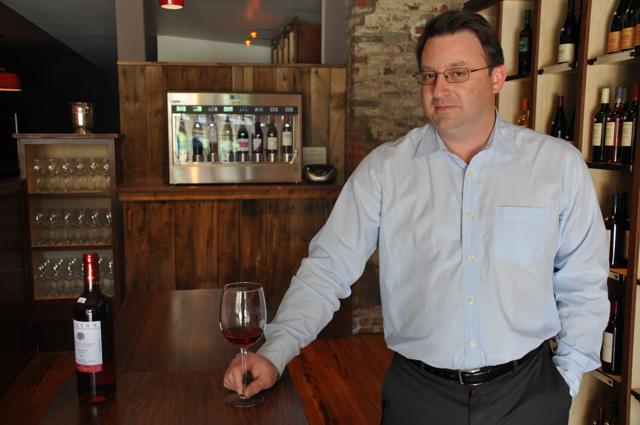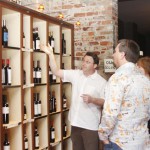- He’s a natural: Natural wine seems like a business well-suited to Asheville. It's certainly well-suited to Doss, whose knowledge in the field seems rather encyclopedic. Photos by Jonathan Welch
- Doss on natural wines: “They're energetic, they're pure and they have a vibrance — for lack of a better word, they have soul.”
To many in the Asheville area, Kathy Taylor and Les Doss are more than former bartenders — they're hospitality specialists. They're experts in the field of drink.
In 2004, Taylor and Doss opened the Usual Suspects, the Merrimon Avenue bar and restaurant that quickly became a standard meeting place for many. Taylor and Doss passed on the business last August to Teri and Greg Siegel, who renamed it Avenue M.
Before that, both Taylor and Doss had been big names in the Asheville scene. Taylor was part of the Charlotte Street Pub staff for nearly 20 years — and was repeatedly voted a favorite bartender by readers of Xpress in our annual Best of WNC poll.
Doss worked at the New French Bar, back when it was located at the corner of Battery Park and Haywood. He had a reputation for introducing patrons to the finer side of drinking. It was Doss, in fact, who steered me gently away from the Crown Royal and toward my first peaty, malty Scotch.
Doss is now opening Asheville's eyes to the world of natural wine with his and Taylor's new wine shop, Vinsite, located next to Bruisin' Ales on Broadway.
Doss and Taylor have been out of the hospitality business for much of the past year — which is a long time for people accustomed to working the front lines almost every night. The couple has done exactly what you might expect them to do — a little traveling, a little dining, a lot of relaxing. "We just went and ate and drank and hung out with friends," says Doss, a certified sommelier who also spent quite a bit of time poring over his new focus.
That focus, natural wine, seems like a business well-suited to Asheville. It's certainly well-suited to Doss, whose knowledge in the field seems rather encyclopedic. Taylor, for her part, is simply adjusting to the change in pace. "It's different. I've never done retail," she says. "It involves a lot of down time. And I've never worked so early."
Doss is reading constantly he says, and seems to be adjusting well to the lifestyle change. "The pace is completely different," he says. "It's also incredibly cool because I can talk about these wines to people all day long, over and over. That doesn't bore me at all. It might bore them, but it doesn't bore me." Those wines are anything but dull — they can even spark debate, at least in places where people discuss such things.
Take Eric Asimov, wine critic for the New York Times, who's quite firmly planted in such a universe. Asimov's column, "Diner's Journal," often focuses on what he calls the "seemingly emotional, threatening issue of natural wines." It seems like rather charged verbiage for a beverage of fermented grapes. But here in Beer City USA, we can relate, right?
Asimov posits that the term "natural wine" suggests that the some wines might be artificial.
"It’s a measure of how nebulous the issue is to say that many people disagree on the use of that phrase," writes Asimov. "Some prefer other terms, like real wine, or natural winemaking."
Regardless of the preferred term, what’s so special about these wines? Asimov describes it this way: "Even trying to define the parameters is difficult and contentious," he writes. "In general, it means striving to farm without using chemical pesticides, fungicides or herbicides. It means plowing fields, and harvesting by hand rather than with machinery."
"Natural wines" may call to mind strange biodynamic practices like burying bullhorns stuffed with manure in a field under the light of the full moon. And truth be told, a very select handful of winemakers who practice biodynamics actually do that once in a while. Who knows, they may even chant. That's not the point.
While organic wines aren't anything new, especially in health-conscious Asheville, these natural-wine makers extend their focus and ideals to the fermenting process. They don't tinker with the character of the wines, says Doss, allowing for true expressions of terroir, of vintage, of the grape itself.
"The wine is what it is," says Doss. "Nothing is taken away, nothing is added. They're energetic, they're pure and they have a vibrance — for lack of a better word, they have soul."
Frankly, that can make for some rather interesting expressions of the grape. One wine Doss pours from his Enomatic, a climate-controlled wine dispenser that doles out his new obsession by the ounce, has "puppy breath" on the nose — and those are his words. It's not entirely unpleasant, strangely.
A section of bottles in the backroom holds "orange wines" — white wines made by the technique of leaving freshly crushed juice in contact with grape skins for a prolonged period. They're rather unique, says Doss.
But not all of the wines that Vinsite stocks are extreme in any fashion, he says. In fact, the majority are handpicked by the couple because they happen to be just plain good. "Some of them taste completely conventional," he says. "But the baseline is that they're sustainably grown."
Low-sulfite and low-additive wines simply mean that the character of the grape shines through, says Doss. And that's something that Asheville can get behind — it's similar to the single-origin chocolates, for example, that seem to taste like where the cacao is grown. Natural wines, simply put, have a purity of expression.
The more extreme wines can be rather variable, says Doss. "They can be off-the-charts good to flat from one bottle to the next," says Doss. He's speaking specifically of the puppy-breath wine right now. "It's a unique expression of that grape and that bottle. Some people just can't get past the nose, he says — and that's unfortunate.
The nose on that wine, the yeasty, fermented smell, is partially due to the presence of beneficial bacteria, eliminated by the sulfites commonly added to wine. "When you put extra sulfites into a wine bottle, it's basically killing all of the bacteria, good and bad," Doss explains. Some of what is killed, says Doss, would otherwise add to the flavor signature of the wines. "We've neutered that completely in wine over the last 50 years or so because we've decided we don't like barnyardy flavors and bready smells … and other natural aromas," he say. "All of these are present in food, why do we have to take that character away from the wine?"
Like a beauty mark, says Doss, what we perceive as flaws are often character traits. "And we've completely homogenized and erased all that. We've almost tried to make wine perfect. You can't make true wine perfect — it is what it is every year."
Interested in tasting what Vinsite has to offer? On Thursday, May 19, the wine shop will host their first tasting, “Intro to Natural Wines” at 6 p.m. Cost is $25 per person. For more information visit vinsiteasheville.com.
— Mackensy Lunsford can be reached at food@mountainx.com






Before you comment
The comments section is here to provide a platform for civil dialogue on the issues we face together as a local community. Xpress is committed to offering this platform for all voices, but when the tone of the discussion gets nasty or strays off topic, we believe many people choose not to participate. Xpress editors are determined to moderate comments to ensure a constructive interchange is maintained. All comments judged not to be in keeping with the spirit of civil discourse will be removed and repeat violators will be banned. See here for our terms of service. Thank you for being part of this effort to promote respectful discussion.